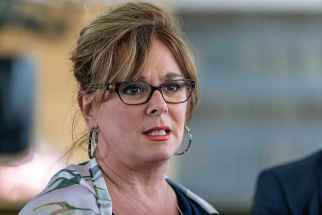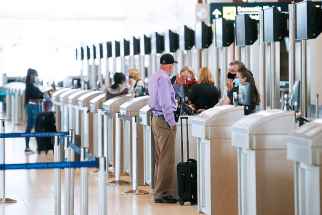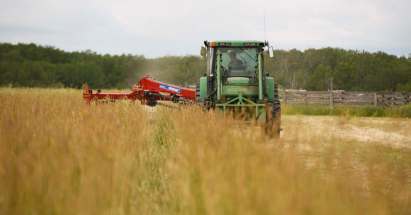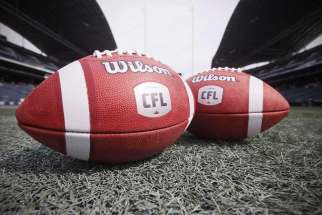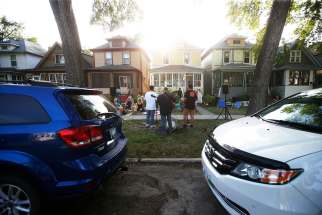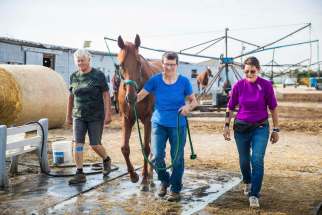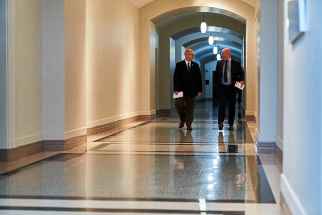CFL’s bizarre odyssey continues Still no decision on 2020 season
Read this article for free:
or
Already have an account? Log in here »
To continue reading, please subscribe:
Monthly Digital Subscription
$0 for the first 4 weeks*
- Enjoy unlimited reading on winnipegfreepress.com
- Read the E-Edition, our digital replica newspaper
- Access News Break, our award-winning app
- Play interactive puzzles
*No charge for 4 weeks then price increases to the regular rate of $19.00 plus GST every four weeks. Offer available to new and qualified returning subscribers only. Cancel any time.
Monthly Digital Subscription
$4.75/week*
- Enjoy unlimited reading on winnipegfreepress.com
- Read the E-Edition, our digital replica newspaper
- Access News Break, our award-winning app
- Play interactive puzzles
*Billed as $19 plus GST every four weeks. Cancel any time.
To continue reading, please subscribe:
Add Free Press access to your Brandon Sun subscription for only an additional
$1 for the first 4 weeks*
*Your next subscription payment will increase by $1.00 and you will be charged $16.99 plus GST for four weeks. After four weeks, your payment will increase to $23.99 plus GST every four weeks.
Read unlimited articles for free today:
or
Already have an account? Log in here »
Hey there, time traveller!
This article was published 14/08/2020 (1944 days ago), so information in it may no longer be current.
One of the most enjoyable parts of covering the Canadian Football League is just how weird things can get. There’s a reason the CFL is often referred to as the Crazy Football League.
The CFL has certainly lived up to that nickname in recent months. And though the craziness is usually limited to antics on the field, what’s been going on off the turf, with the league trying to come up with a way to play a shortened 2020 season amidst the COVID-19 pandemic, has given a whole new definition to the bizarre.
First, let’s address the elephant in the room. Another week has passed and still no update. This is incredible, given how little runway the CFL has left to get things up and running, even if it isn’t all that surprising at the same time.
After all, the league has already issued two deadlines in recent weeks, only for them to come and go without as much of a peep from commissioner Randy Ambrosie.
Another week has passed and still no update. This is incredible, given how little runway the CFL has left to get things up and running.
What is weird, though, is after spending much of Friday making calls to people in and around the CFL, I was left feeling more optimistic than I have in weeks.
Now, before you jump out of your seat, consider that I’ve been pretty hard on the CFL during this whole process because 1) I haven’t had any reason to feel otherwise and 2) I want to be able to tell readers what the heck is going on, much of which to this point has no doubt been a mess.
Further, to be clear, though a few people I spoke to seem to think a six-game regular season, eight-team playoff format, to be played in Winnipeg and starting no sooner than late September, is possible — with some even suggesting likely — I’m still not one of them.
Every time I think of a fall campaign here I remember Mother Nature usually skips that season and heads straight for winter. Just the thought summons memories of watching employees, some of whom were in suits under winter jackets, shovelling out a snow-jammed IG Field ahead of a victory over the Montreal Alouettes on, gulp, Oct. 12.
Just think: that’s around when any potential season would start.
But there is some good news. While the CFL and CFL Player’s Association have struggled mightily throughout this agonizing process, they’ve appeared to reach common ground. Although a revised collective bargaining agreement for 2020 has yet to be finalized, both sides have agreed upon most of it.
The one remaining issue centres on compensation. Players want guaranteed contracts in the event a season must be permanently halted due to a coronavirus outbreak. As much as that might be important for some — and certainly valuable for all — the feeling is it won’t be enough to convince a majority of players to sit out, even as more and more take to social media to criticize their employer.
The other thing is long-term health concerns. With still so much still to figure out about the lasting effects for those who contract COVID-19, players want assurance they’ll be taken care if they test positive for the virus. But that, too, seems to be close to reaching a resolution.
With still so much still to figure out about the lasting effects for those who contract COVID-19, players want assurance they’ll be taken care if they test positive for the virus.
According to a number of sources, what we’re waiting on is what I call a three-step process. And they need to happen in order.
The first two things involve movement from the always slow — and currently overburdened — Canadian government.
The word is that Manitoba Health is willing to give the go-ahead to the CFL and its health and safety protocols around having a hub city in Winnipeg. But the league needs approval from the feds and that’s what’s being dragged out — and for good reason.
The CFL is trying to do this massive endeavour on a shoestring budget, and before Health Canada can give its final approval, it wants to make sure the league has all its I’s dotted and T’s crossed.
There are dozens of American players, many of whom are living in states where the coronavirus has spiralled out of control, and the CFL needs to assure health officials that it is capable of successfully executing the plan.
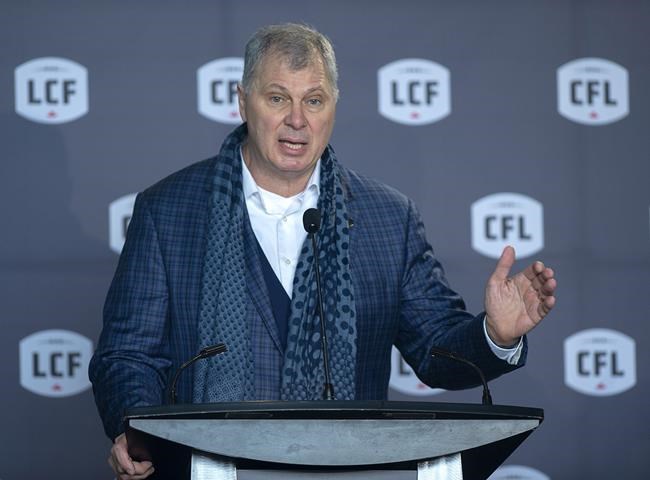
Once that is done, the CFL will need the government to approve a $30-million interest-free loan that will be used mainly to pay player salaries and cover costs associated with the hub-city model.
One has to think that given how much cash the feds often use to bail out large and small corporations, it will be willing to loan the CFL the cash.
What’s most interesting is the third and final part: the league making a final decision on whether to play.
I thought if the first two went through, then a decision to play would be automatic. I’m not so sure that’s the case anymore, and I have my theories as to why.
It was in May, less than two months after the coronavirus struck, that the CFL was seeking as much as $150 million in the event of a lost season. The league included a breakdown of that number, which included an immediate need for $30 million because it was receiving next to no revenue.
Many teams have come forward since then to claim potential losses of up to $10 million if the season is lost.
I see no coincidence that the number the CFL is looking for now matches the same number they were looking for back then as an immediate need. What has changed since then? Not much.
The other issue is timing. If this was a serious option, then why wasn’t this being explored months ago? Why did the CFL think they had the leverage to cancel meetings with the CFLPA, some as early as two weeks ago?
Something that stuck out to me in a rare chat with Ambrosie in June was his comment about how much of the league’s focus was being put on the 2021 season. He seemed almost excited at the prospect of refiguring the CFL’s business model, something that is in desperate need of an overhaul.
I wonder: if the CFL is able to get the interest-free loan, will they be able to keep it even if there is no football in 2020? After all, the league will certainly need that cash to start up in 2021.
If the CFL is able to get the interest-free loan, will they be able to keep it even if there is no football in 2020? After all, the league will certainly need that cash to start up in 2021.
“I hope they wouldn’t be putting us through all this…” one team executive told me before stopping himself. “I have to believe they’re trying to see us through 2020.”
I’m not so sure of that given the timeline. Just consider what players still have to do. They have to quarantine for 14 days before they get to Winnipeg. That means for those who have another job, there will be no chance of giving their employer two weeks notice.
They’ll also have to get their ducks in a row to be sure they’re able to quarantine, meaning they can’t be around their family unless everyone is in lockdown. Then you have to prepare to be away from home for 12 weeks.
That doesn’t even consider the time it will take to have players approve a new CBA. It’s enough to make your head spin.
For a league known for it’s weirdness, things are about to get a whole lot crazier in the coming days as a decision will ultimately need to be made.
jeff.hamilton@freepress.mb.ca
Twitter: @jeffkhamilton

Jeff Hamilton
Multimedia producer
After a slew of injuries playing hockey that included breaks to the wrist, arm, and collar bone; a tear of the medial collateral ligament in both knees; as well as a collapsed lung, Jeff figured it was a good idea to take his interest in sports off the ice and in to the classroom.
Our newsroom depends on a growing audience of readers to power our journalism. If you are not a paid reader, please consider becoming a subscriber.
Our newsroom depends on its audience of readers to power our journalism. Thank you for your support.







